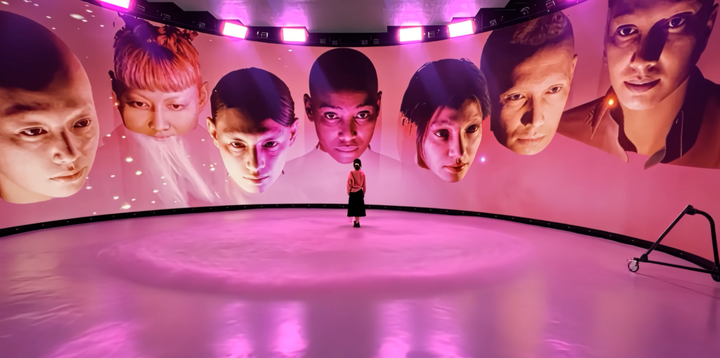Feature in Article "Discovery the "True Self" in the Virtual Digital World: Ziyi Zhang’s Digital Poetics"
- Oct 12, 2025
- 3 min read
Updated: Dec 26, 2025
This is an English translation fo the article published on China.com

In the age of AI and modern technology, can human identity and existence be computed, stored, and even coexist within the digital realm—perhaps achieving a form of immortality? This question seeks to break the boundaries between the physical and the virtual, inviting a philosophical reflection: if emotions and memories can be digitized, can the soul, too, exist in digital form?
She is a traveler between technology and art, wandering through the tides of data and human memory, capturing fleeting “fragments of the soul.”Ziyi Zhang, a rising multimedia artist, builds emotions through digital form and reconstructs memories with algorithms.
In her representative work Digital Soul & Data Metamorphosis, Zhang creates a terrarium-like rainforest between the physical and virtual worlds, where thousands of data-driven butterflies flutter in motion. Each butterfly holds fragments of her memory, thoughts, dreams, and emotions. When two butterflies meet, artificial intelligence reads and merges their stored information, generating new content that is then released back into the digital ecosystem.

When this work was exhibited at Singapore’s Tanjong Pagar Distripark, it received an enthusiastic response. Audiences not only observed but interacted—communicating with the butterflies and leaving behind their own digital traces. In this immersive experience that transcends text and space, Zhang initiated a dialogue about the soul itself:When emotions can be encoded and memories stored, can the “self” remain authentic?
Zhang explains, “I created a massive terrarium, like a container for souls—to carry countless butterfly fragments. Each butterfly bears pieces of my memory, emotion, thought, and cognition. As AI evolves, these memory fragments collide and grow parallelly in the virtual world. I chose the butterfly as a symbol because once, in a specimen shop, I saw a beautiful large blue butterfly—each one unique, as if every version of ‘me’ is distinct and irreplaceable.”
In another work, A.I. Grottoes, she uses AI to transform news images into the style of Dunhuang murals, questioning within a virtual cave:When generated images replace the traces of the hand, can the spirit of craftsmanship endure?
The work was created in 2022—a year marked by the rapid rise and heated debate surrounding AI-generated art. Zhang captured the cultural pulse of the moment, reinterpreting it through her own distinct digital poetics.

“I have always been fascinated by the mysticism of Dunhuang,” she recalls. “I personally traveled to the Mogao Caves, and when I stood before those murals, I was overwhelmed by their beauty and the timeless craftsmanship behind them. It made me wonder: in today’s world, where images can be mass-produced by AI, what will become of the artisan’s spirit?”
In May 2025, Zhang’s work Hold On, My Last Castle was exhibited at NYCxDesign Week in New York. Presented as an experimental short film, the piece unfolds in a post-climate-disaster world: the city has been submerged by rising seas, its skyline swallowed underwater. A solitary figure, clad in a “moving castle,” walks slowly through ruins and floods. It is not merely a narrative about environmental crisis, but also a parable of reconstruction and perseverance:When civilization collapses, humanity must rebuild shelter, memory, and meaning from the remaining fragments.
The overwhelming red that floods the scene is more than visual atmosphere—it is the Earth’s final cry, a warning for us to protect our shared, fragile home.

Zhang’s works often carry a dual tension—the grand and the intimate. They explore human alienation and algorithmic identity in the age of AI while preserving tenderness and empathy at their core. Through her art, she reminds us:Though human emotions, memories, and existence may be translated into data, they still require a poetic vessel—a space that can hold every version of our “true selves.”



